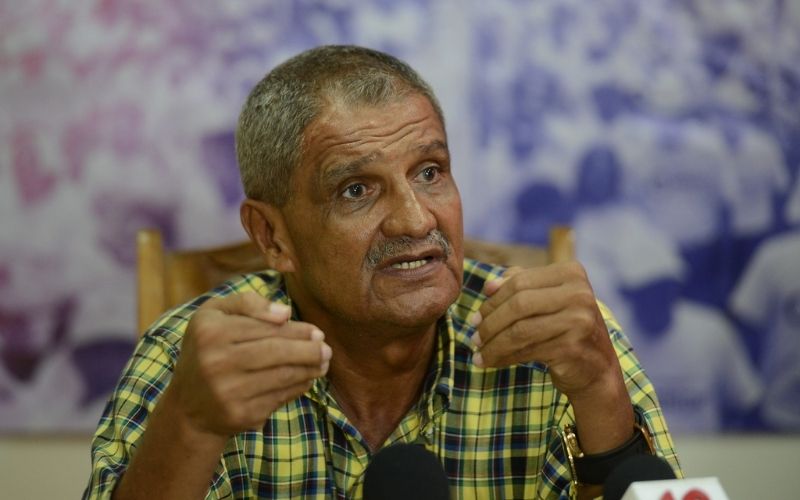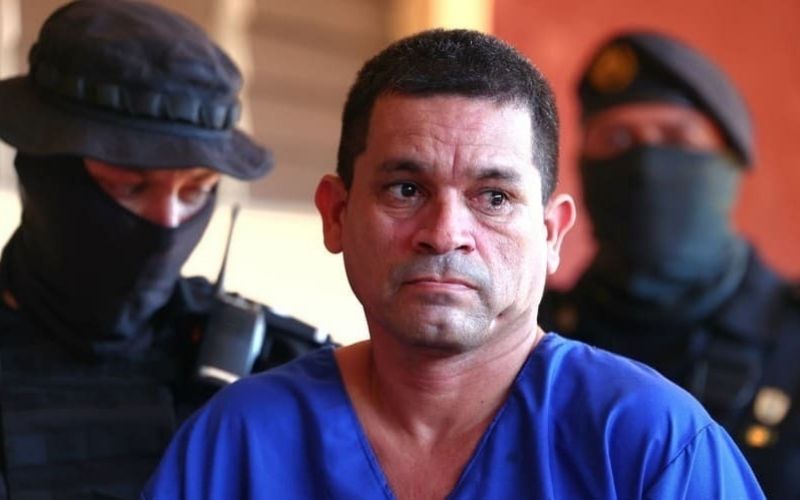Where Are The 30+ Missing Nicaraguan Political Prisoners?

They were arbitrarily arrested months — or even years — ago. Their families search for them in prisons and hospitals, but no one will confirm where they are.
HAVANA TIMES – Some were arrested at midnight during raids carried out without any court order. Others were lured in with the excuse that authorities just wanted to “ask them a few questions.” Several were beaten in front of their families: partners, parents, or young children. Police officers or armed civilians took them away months or even years ago, and no one has seen them since. They are Nicaragua’s disappeared political prisoners, because even their own families have no certainty about where they are, despite searching from prison to prison and even in hospitals.
There are still more than 70 political prisoners in the country, and the whereabouts and conditions of 32 remain unknown. Their families cannot bring them food, medicine, or even visit them.
Of the 32 disappeared political prisoners, 30 have been identified by name, and two are known only as “anonymous.” Among the 30 are opposition members, dissidents, and retired military officers. Others simply held jobs in churches, took part in the 2018 protests, or are relatives of an opposition figure.
At CONFIDENCIAL, we explain who these disappeared political prisoners in Nicaragua are, when they were arrested, and what they are accused of. The list is based on the report from the Mechanism for the Recognition of Political Prisoners, published in October 2025. It also includes information from the Inter-American Commission on Human Rights (IACHR), which has granted precautionary measures in most of the cases, as well as data from relatives, citizen networks, and human-rights organizations and former political prisoners.
The political prisoners disappeared by the dictatorship
Among the 30 prisoners of conscience who have been disappeared, there are 22 men and 8 women; ten of them are over 60 years old. All were arbitrarily arrested, and most have no formal charges or have not been brought before a court hearing, according to publicly available information from the judicial system.

Brooklyn Rivera Bryan
Miskito leader, ousted regional lawmaker, and president of the Yatama Indigenous party. He was detained on September 29, 2023, in Bilwi. He is 73 years old, and none of his relatives have been allowed to see him. In October 2023, the IACHR granted him precautionary measures.

Douglas Gamaliel Álvarez
Douglas Álvarez is 46 years old. He is a former Contra member and originally from El Castillo, in Río San Juan. He sought asylum in Costa Rica but was extradited to Nicaragua on February 16, 2024. The regime accuses him of killing a police officer and a civilian in October 2022.

Víctor Boitano Coleman
A retired Army colonel, 64 years old. He was detained on April 23, 2024, in Managua. His wife reported that police officers beat him before taking him away. Some former political prisoners say they have seen him in La Modelo prison, but there is no official information.

Angélica Chavarría
She is 39 and originally from Managua. Her family last heard from her on May 20, 2024, when the home of her partner and former Army chief, Humberto Ortega, was raided. Ortega died on September 30 as a political prisoner. The IACHR granted her precautionary measures in January 2025.

Eddie González Valdivia
A retired military officer and university professor, 67 years old. He was detained on July 14, 2024, by police and armed civilians during a shootout. He is accused of attempted aggravated homicide and other crimes.

Carmen Sáenz
A lawyer and former diocesan adviser in Matagalpa. She was detained on August 10, 2024, without a court warrant, after authorities told her they only wanted to question her. She is 51 and remains imprisoned with no formal charges.

Lesbia Gutiérrez
She managed a financial program for Cáritas Diocesana in Matagalpa. She is 60 years old and was detained on August 10, 2024, without a judicial order. Since then, no one has confirmed where she is, nor have authorities allowed her to receive visitors.

Steadman Fagoth
Miskito leader, former political ally, and former presidential adviser to Daniel Ortega. The Nicaraguan Army confirmed that it detained him on August 14, 2024, in Waspam and later handed him over to the Police. In March 2025, the Inter-American Court of Human Rights ordered his release along with five other political prisoners.

Alejandro Hurtado
He is 57 and a board member of the Independent Liberal Party. According to his brother, he was detained on January 27, 2025, for proposing a national dialogue with Ortega and Murillo. The IACHR granted him precautionary measures in March 2025.

Marcos Cruz Moncada
A multigrade primary school teacher. He is 42 and from San Francisco del Norte in Chinandega. He was detained on February 14, 2025, by armed civilians linked to the regime. Two days earlier, he had resigned from his teaching position.

Álvaro Baltodano Cantarero
A former Sandinista guerrilla and retired brigadier general, 73 years old. He served as Ortega’s political operator in the opposition and as a ministerial adviser from 2007 to 2022. He was detained on May 14, 2025, in Matagalpa and sentenced to 20 years in prison for alleged “treason,” along with an order to confiscate all his assets.

Álvaro Baltodano Monroy
A businessman and son of the retired military officer. He was detained on July 21 while traveling on the Nandaime–Rivas highway. At the same time, Police were raiding his home in Managua. He managed several businesses and investments, including the confiscated Momotombo Plant. He was accused of money “laundering.”
The Political Prisoners of Carazo
In 2018, the municipality of Jinotepe, in the department of Carazo in southeastern Nicaragua, was one of the main strongholds of the citizen protests during the April Rebellion. Thousands joined marches and built barricades, and many suffered official repression.
At midnight on July 17, 2025, the homes of several opposition members and their relatives were raided without a court order.
Among those arrested was an evangelical family accused of conspiracy and treason. According to judicial sources, they were sent to the prisons in Granada. However, their relatives were denied any information while at the facility.

Rudy Palacios Vargas
He is 54 and pastor of the La Roca evangelical church. He went into exile in August 2018 and returned to Nicaragua in February 2020 due to cancer. From April 2024, he was receiving “visits” from the Police, which became “weekly” in April 2025.

Jessica Palacios Vargas
She is 47 and Rudy Palacios’ sister. She participated in the Jinotepe protests in 2018. In May 2025, the Police raided her home, accusing her of holding political meetings.

Pedro José López
He is 40 and Jessica Palacios’ husband. Police beat him during his arrest and accused him of holding political meetings during the May 2025 raid. (His photo and part of his surroundings were reconstructed with AI.)

Olga Lara Rojas
She is 45. She was an FSLN councilor until 2010, when she resigned after her uncle, Leonel Rojas, was removed as Jinotepe’s vice mayor. She is Jessica Palacios’ aunt by marriage. She went into exile in August 2018 and returned to Nicaragua in May 2020. She was also subject to police harassment.

Armando Bermúdez
He is 40 and the brother-in-law of the Palacios siblings. He had no known political activity, but his detention was part of a raid targeting opposition members and their families.
The dictatorship ordered another crackdown on citizens and opposition members. Between August 13 and 15, dozens of people were arbitrarily arrested, including entire families, activists, opposition members, and political prisoners from 2018 who were captured again.

María José Rojas
A 44-year-old opposition member, daughter of Rodolfo Rojas Cordero, who was kidnapped in Costa Rica and murdered in Honduras in 2022.

Carlos Brenes Sánchez
He is 70. A former Sandinista guerrilla, retired Army colonel, and founder of the Patriotic Group of Retired Military, he had already been a political prisoner from 2018 to 2019, confined in a punishment cell.

Salvadora Martínez Aburto
She is 68. She was arbitrarily detained alongside her husband, Carlos Brenes. In 2018, she denounced her husband’s arrest and spoke out for his release.

Marvin Campos Chavarría
A 69-year-old visual artist, who had been under police harassment since the 2018 protests.

Chester Cortéz Narváez
He is 38, an opposition activist and member of the Movimiento Autónomo 18 de Abril. He participated in the citizen protests of the April Rebellion.

Rafael Acevedo Guevara
He is 49, known as “the teacher,” recognized for his solidarity in the community. He was also a political prisoner between 2018 and 2019 and was tortured.

Mario Rodríguez Serrano
He is 63 and already had precautionary measures from the IACHR due to threats against his opposition family.

Oscar Enrique Velázquez
He is 37, a political prisoner from 2018. He went into exile and later returned to Nicaragua. (No photos of him were found.)
The Political Prisoners of Masaya
Masaya was another stronghold of the April Rebellion. On August 13, several citizens and opposition members were arbitrarily arrested during a raid.

Yolanda González Escobar
56 years old, an opposition member and victim of police harassment and surveillance. She has had precautionary measures from the IACHR since August 2022.

Octavio Enrique Caldera
25 years old, an opposition activist, accounting student, and member of the Nicaraguan University Alliance (Alianza Universitaria Nicaragüense, AUN).

Luis Ortiz Calero
29 years old, originally from La Concepción, works at an automotive company. He had previously been a political prisoner.

Larry Martínez Romero
31 years old, a construction worker, participated in the 2018 protests, and had already been a political prisoner. (No photo available.)
—–
This is the list of disappeared political prisoners, verified by the Mechanism for the Recognition of Political Prisoners, through families, human rights organizations, and citizen networks. However, there are many more cases that are not yet recorded due to lack of information or fear of reporting.





